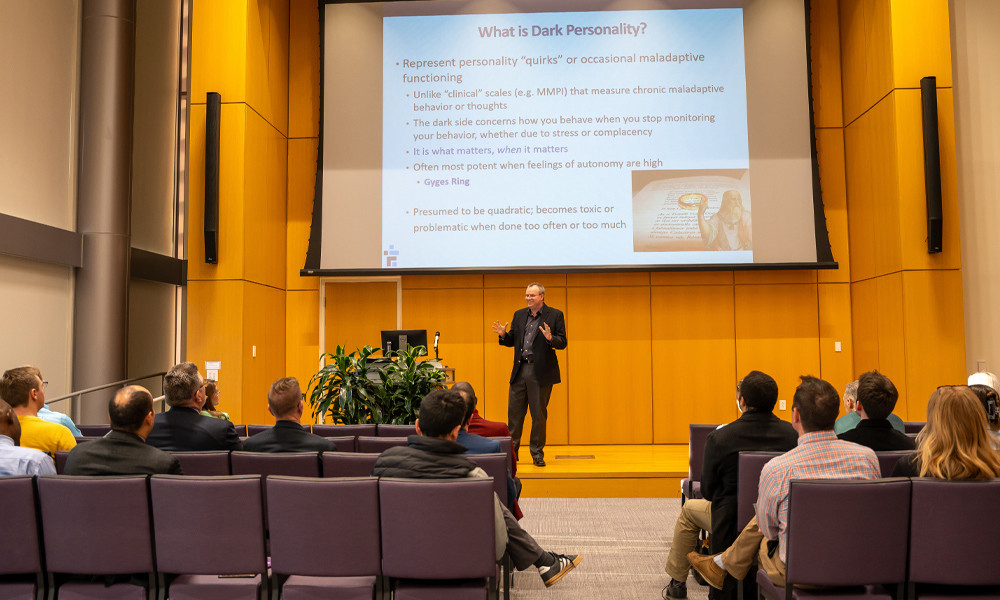Confronting the darkness around and within us
News
SUMMARY: In remarks at JMU’s School of Strategic Leadership Studies 2024 Research Forum, social psychologist Peter Harms examined the nature and effects of dark and destructive leaders throughout history.
What is the proper role of government? What is the proper place of people in such systems, in terms of the amount of power and autonomy they should wield? Such are some of the questions that have preoccupied Peter Harms, of the University of Alabama’s Culverhouse School of Business, since he first moved away from his small rural hometown and took up residence in “big cities with big universities.”
Harms, an admired social psychologist, was the keynote speaker on February 29 when JMU’s School of Strategic Leadership Studies (SSLS) presented its biennial Research Forum in Hartman Hall. His talk was titled "The Fifth Age: Leaders, Followers and the Corruption of Man."
In it, Harms described the distinctive malaise with which he said the modern world is currently afflicted. During impromptu remarks made prior to the start of his speech, Harms noted that “it sometimes feels as though we are living through times of unprecedented peril and uncertainty,” with toxic and divisive leaders rising to power who “threaten to unbalance the world around us.”
For 25 years, Harms said, he has investigated the disposition and make-up not only of the worst among us, but also the hierarchical systems – organizations or governments – in which such malefactors arise. Drawing on a mixture of research and folklore (from the creation myths of the ancient Greek poet and philosopher Hesiod to a satirical play by the Soviet-era Russian writer Yevgeny Schwartz), Harms explored in his talk at JMU the nature and effects of dark and destructive leaders and how they have been understood across the millennia.
Harms cited the influence on him during his undergraduate years at the University of British Columbia of Delroy Paulus, co-originator of the term “dark triad” in referring to the points of similarity among three aversive personality types – narcissists, Machiavellianists and psychopaths.
He also addressed how and why persons who display the patterns of behavior associated with these three types gain power in the first place – whether at the group, firm or national level. Harms’s talk not only illuminated the threats such bad actors pose, but also offered recommendations on how to confront what he characterized as “the darkness both around and within us.”
“It can be a scary thing,” said Harms, “to fight the monsters outside of us – the bad people with all the power – because they truly can hurt you, and even destroy you.”
Even more urgent, however, is the struggle against the dark impulses that can unhinge one’s own soul, Harms said. These include, it appears, a growing willingness to capitulate to autocratic regimes that promise strong leadership and moral clarity in exchange for unquestioning loyalty and obedience.
“The battle within may be the more important one,” said Harms.
The invitation to speak at the forum was extended by Adam Vanhove, professor in the SSLS and the College of Business Madison Scholar for the 2023-24 academic year. Vanhove and Harms have collaborated on several projects for the U.S. Army which were directed toward mitigating mental health issues among recruits and improving their resilience.
Harms is the Frank Schultz Endowed Professor of Business in the Management department at the University of Alabama’s Culverhouse College of Business. He received his Ph.D. in 2008 from the University of Illinois at Urbana-Champaign.
The overall focus of Harms’s research is on the assessment and development of leadership, personality and psychological well-being. He has published more than 180 articles, books and chapters which have collectively been cited more than 19,000 times and featured in numerous popular media outlets such as CNN, the BBC, Forbes magazine and Scientific American. His research has received more than $12 million in grants and contracts from agencies such as NASA, the U.S. Army, the U.S. Department of Labor and the National Science Foundation.
Harms was selected as one of the "100 Knowledge Leaders of Tomorrow" by the St. Gallen Symposium and is a fellow of both the Society of Industrial and Organizational Psychology and the Association for Psychological Science.
